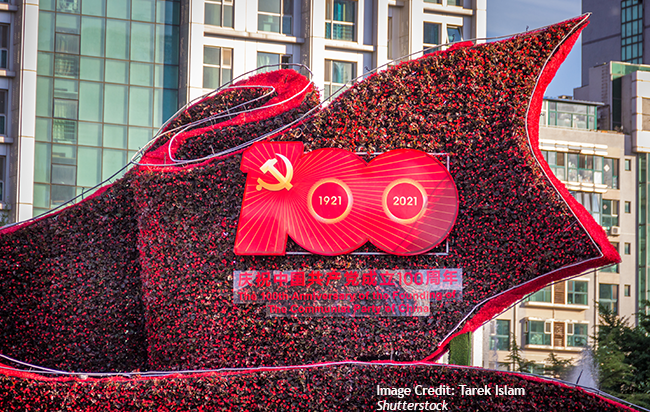China’s Sixth Plenary Session: A Historical Resolution for the CCP Centennial

The 19th Central Committee of the Chinese Communist Party’s (CCP) sixth plenary session held in Beijing from November 8 to 11 is one of the most important events on the CCP´s political agenda. The plenum is held at a special time as 2021 marks the CCP’s centennial and reviewed the nation and the party’s achievements and lead the way for the future leadership and policy-vision of China. Chairman Xi Jinping was praised for his accomplishments as core leader. Hundreds of CCP officials deliberated during the four-day conclave on a “historical resolution” providing a narrative for the past and the future of China. Xi is expected to seek a third term next year during the Party’s 20th Congress in autumn 2022, breaking away from the two-term limit tradition and consolidating his power as the most influential leader since Mao.
“The Chairman of Everything”
The meeting held particular importance for Xi Jinping in his nine years of rule in which he has emerged as the most powerful CCP leader since Mao. He is the only other General Secretary to be mentioned by name in the Party’s Charter while still alive. Xi holds the three highest positions of power: General-Secretary of the CCP, Chairman of the powerful Central Military Commission (CMC), and President of the Republic. In light of the 2018 constitutional amendment, Xi is not only expected to run for a third term but also remain in power for life. He has accumulated more titles than his predecessors Jiang Zemin and Hu Jintao and has developed a strong centralized leadership style resembling Mao’s. The plenum’s report presents Xi, “the Great Helmsman”, as the architect of the natural continuation of Mao Thought. His doctrine, Xi Jinping Thought which has been added to the Chinese Constitution, paves the way for a deep reforming of Chinese public life.
Right before the commencement of the Plenum, Xi was celebrated in Chinese media for his successes such as the elimination of absolute poverty. He has pledged to improve the living standards of Chinese people, correct the inequalities faced by society and reverse the strand of slowing growth. Through economic reforms, Xi has successfully reinforced the CCP’s grip on key sectors of the Chinese economy. One goal has also been to clean up the party with anti-corruption campaigns targeting low and high rankings officials. The most notable impact of Xi’s time in power is repression. His consequential centralization of power has alarmed the international community, especially concerning human rights issues in Xinjiang, Tibet, and Hong Kong and on China’s aggressive foreign policy stances towards Taiwan and in the South and East China Seas. While the Plenum will consolidate Xi Jinping’s power further, his plan to revive the Chinese Dream could threaten to deepen conflicts and escalate tensions abroad and domestically.
Celebrating the CCP’s centennial
Xi Jinping presented a work report on behalf of the Political Bureau going over the major achievements and historical experience of the CCP’s 100 years of endeavors. “China has further consolidated its international status. All these factors have provided the cause of national rejuvenation with more robust institutions, stronger material foundations, and a source of inspiration for taking greater initiative,” the report said. Referring to the Belt and Road Initiative, and the vaccine diplomacy, the Political Bureau further hailed China’s foreign policy. Moreover, Xi highlighted the necessity of solving the Taiwan issue through complete reunification.
The term “historical resolution” has only been mentioned only twice before by the Communist Party, and carries significant political implications. The first time was in 1945 to consolidate Mao’s power, and the second time in 1981 when Deng Xiaoping presented his opening-up reforms and condemned the excesses of the Cultural Revolution. As opposed to Mao and Deng, who used these plenary sessions to introduce institutional changes to correct flaws in the system, Xi’s Plenum was marked with praise and fanfare for the system.
Xi Jinping’s political maneuvers since 2012, cemented during the plenum, emanate from his realization that the CCP’s influence is at stake. To reinforce the party’s legitimacy, Xi is battling the private sector, corrupt party members, and the spread of liberal values. But simultaneously pushing economic reforms and preventing liberalization present contradictions that could eventually threaten Xi’s position. Xi also used the plenum to rewrite the CCP’s history through a materialist lens. The Chairman is determined to suppress what he considers to be “historical nihilism”, slander against revolutionary leaders and discrediting of the Party. By altering the historical narrative of the past, Xi is shaping the future.
The Future of the CCP
In the last thirty years, the CCP’s plenary sessions have addressed the party’s agenda, ideology, and future leadership. But this year’s plenum did not mention the vital subject of leadership succession, failing to designate a potential candidate to replace Xi. With a likely third term in 2022, and potentially a fourth in 2027, Xi Jinping is leaving no room to plan for succession. The current Vice President Wang Qishan is not in favor at the moment. Wang disagrees with the crackdown on the private sector and disapproves of the ‘common prosperity’ objective put forward by Xi.
An indication of Xi Jinping’s planning could be his choice for the future premier, the CCP’s number two. If Xi selects a member of the current Premier Li Keqiang’s faction, the “Communist Youth”, it would suggest Xi is inclined to accommodate himself with his political rivals to prolong his power. Indeed, Xi’s challenges also come from within the party which is split into different political factions. With his anti-corruption campaigns and increased censorship, Xi is facing growing pressure and discontent, which could in the medium term endanger his leadership. Finally, with his personalization of power and emphasis on loyalty rather than competence, Xi is promoting a generation of weak and unprepared leaders.